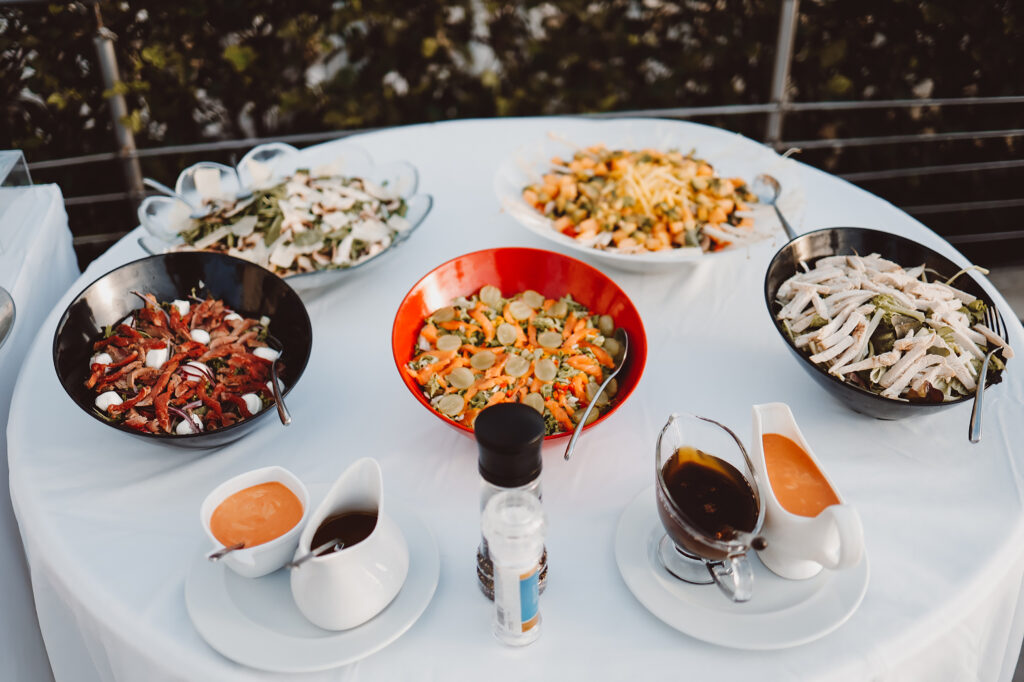Meal planning can be a daunting task for beginners, but with practice, it becomes easier to navigate. To start, it is crucial to identify who you are cooking for and their specific dietary needs. By choosing recipes that you are already familiar with and have proven to be successful, you can save time and ensure that the meals will be enjoyed. Before heading to the grocery store, it is essential to create a shopping list and check your pantry and fridge for any ingredients you may already have. When planning your cooking schedule, opting for larger recipes that provide leftovers and doing prep work in advance can be time-saving strategies. Additionally, utilizing your freezer for storing meals and organizing your fridge and pantry for the following week will help maintain an efficient meal planning system. Finally, incorporating meal prepping into your routine ensures that you have a well-thought-out plan for meals throughout the week, saving both time and energy.

Read more about the cooking news
Identifying Your Needs
When it comes to meal planning, it’s essential to start by identifying your needs and the needs of those you are cooking for. This step is crucial as it lays the foundation for the entire meal planning process. Consider the dietary restrictions and preferences of the individuals you are cooking for. Are there any allergies or intolerances to consider? Does anyone follow a specific diet, such as vegetarian or gluten-free?
In addition to dietary restrictions and preferences, it’s also important to take into account any specific nutritional needs. Are you looking to incorporate more protein into your meals? Do you need to focus on increasing your intake of fruits and vegetables? Understanding the nutritional needs of yourself and those you are cooking for will help you create meal plans that are both healthy and balanced.
Another factor to consider when identifying your needs is the number of meals you need to plan for. Are you planning for just yourself? Or do you have a family to feed? Take into consideration breakfast, lunch, dinner, and any snacks or desserts that may be needed. By having a clear understanding of the number of meals you need to plan for, you can ensure that you have enough variety and quantity to meet everyone’s needs.
Choosing Recipes
Once you have identified your needs, it’s time to choose the recipes that will make up your meal plan. It’s always a good idea to start with recipes that you are familiar with and know are successful. These recipes may be family favorites or dishes that you have mastered over time. This ensures that you have a solid foundation for your meal plan and reduces the risk of any unforeseen cooking disasters.
While sticking to familiar recipes is important, it’s also a good idea to occasionally experiment with new recipes. Adding variety to your meal plan helps keep things exciting and prevents mealtime monotony. Try out new recipes that align with the dietary restrictions and preferences you have identified. This can be a fun way to discover new flavors and expand your culinary repertoire.
When choosing recipes, it’s also important to consider the cooking time and complexity. Opt for recipes that fit into your schedule and do not require excessive time and effort. If you have a busy week ahead, choose recipes that can be prepared in advance or cooked in a slow cooker or pressure cooker for added convenience. By considering the cooking time and complexity of the recipes, you can ensure that your meal plan is both realistic and manageable.

Read more about the cooking news
Creating a Shopping List
Once you have chosen your recipes, it’s time to create a shopping list. Before heading to the store, check your pantry and fridge for ingredients you already have. This will help you avoid purchasing duplicates and save money. Make a note of the items you need to buy and ensure that your list is comprehensive and includes everything you will need for your meal plan.
When creating your shopping list, it can be helpful to categorize the items based on the store layout. This will make your shopping experience more efficient and prevent unnecessary backtracking. Categorize your list into sections such as produce, dairy, meats, pantry staples, and frozen foods. By organizing your shopping list in this way, you can navigate the grocery store more seamlessly and save time.
Planning Your Cooking Schedule
Planning your cooking schedule is an integral part of successful meal planning. One strategy is to opt for larger recipes that provide leftovers for multiple meals. This not only saves time but also ensures that you have meals readily available for busy days. Leftovers can be enjoyed as is or repurposed into new dishes to add variety to your meal plan.
To save time during the week, consider doing prep work in advance. Chop vegetables, marinate meats, or portion out ingredients ahead of time. This allows you to simply assemble and cook on the day of the meal, reducing the overall cooking time. By taking advantage of prep work, you can streamline your meal preparation process and free up time for other activities.
Utilizing appliances such as slow cookers or pressure cookers can also be a game-changer when it comes to convenient cooking. These appliances allow you to set it and forget it, making meal preparation a breeze. Slow cookers are particularly useful for recipes that require longer cooking times, while pressure cookers can significantly reduce cooking time for dishes that would traditionally take hours.

Utilizing Freezer for Storage
The freezer is a valuable tool when it comes to meal planning. It allows you to prepare meals in advance and store them for later use. To make the most of your freezer, it’s essential to label and date your freezer meals for easy identification. This ensures that you can easily find specific meals when needed without having to dig through a freezer full of containers.
When choosing containers or freezer bags for different types of food, it’s important to select those that are suitable for freezing. Look for containers that are freezer-safe and can withstand freezing temperatures without becoming brittle or cracking. Freezer bags should be heavy-duty and have a reliable seal to prevent freezer burn and maintain the quality of the food.
When storing freezer meals, it’s also important to take note of the thawing and reheating instructions. Proper thawing and reheating techniques ensure that your meals are safe to consume and maintain their taste and texture. Follow the recommended methods for thawing, whether it be in the refrigerator overnight or using the defrost function on your microwave. Reheating instructions may vary depending on the dish, so be sure to follow the specific guidelines provided for each freezer meal.
Organizing Your Fridge and Pantry
An organized fridge and pantry are essential for successful meal planning. Before heading to the grocery store, take the time to clean out and organize your fridge and pantry. Remove any expired or spoiled items and consolidate similar items to free up space. This not only ensures that you have a clear view of what you already have but also makes room for the new groceries you will be purchasing.
Grouping similar items together in your fridge and pantry makes meal preparation much easier. Keep all your dairy products together, fruits and vegetables in designated drawers, and condiments and sauces in a specific area. This way, when you are cooking, you can easily locate the ingredients you need without wasting time searching through a cluttered fridge or pantry.
Arrange food items with expiration dates in a way that ensures they are used first. This prevents food waste and ensures that you are utilizing ingredients before they go bad. Arrange items with expiring dates in a visible location so that they are top of mind when planning and preparing meals. By organizing your fridge and pantry, you can streamline your meal planning process and reduce the chances of ingredients going to waste.
Embracing Meal Prepping
Meal prepping is a meal planning strategy that involves preparing meals or meal components in advance. It is a highly efficient way to save time and ensure that you have a plan for meals throughout the week. To embrace meal prepping, set aside a specific day dedicated to meal prepping. This can be a weekend day or a day when you have more free time available.
When meal prepping, it’s important to prepare ingredients in bulk and store them properly. Chop vegetables, cook grains, and portion out proteins in advance. Store these ingredients in airtight containers or resealable bags to maintain their freshness. By having these prepared ingredients on hand, you can significantly reduce the time it takes to prepare meals during the week.
Having a plan for portioning out meals and storing them in individual containers is crucial for successful meal prepping. Invest in a set of reusable containers in various sizes to meet your portioning needs. Divide meals into individual servings, label them if necessary, and store them in the fridge or freezer depending on how soon they will be consumed. This not only saves time but also ensures that you have healthy and balanced meals ready to go.
Considerations for Beginners
If you are new to meal planning, it’s important to start slowly and build your confidence over time. Begin with simple and familiar recipes that you feel comfortable preparing. This allows you to focus on the basics of meal planning without feeling overwhelmed. As you become more comfortable, gradually increase the number of meals you plan for. Start with planning a few dinners a week and then expand to include breakfast, lunch, and snacks as you gain experience.
Don’t hesitate to seek advice from experienced meal planners. Reach out to friends or family members who have successful meal planning routines and ask for their tips and tricks. Join online communities or forums dedicated to meal planning, where you can find inspiration, advice, and support from like-minded individuals. Remember that meal planning is a skill that takes time to develop, and with practice, it will become easier and more efficient.
Incorporating Variety into Meal Planning
Variety is key when it comes to meal planning. Including a balance of different food groups ensures that you are meeting your nutritional needs and prevents boredom with your meals. Make sure to incorporate fruits, vegetables, whole grains, lean proteins, and healthy fats into your meal plan. Experiment with different cuisines and flavors to keep meals exciting and enjoyable.
To add variety to your meal planning, consider planning for theme nights or special occasions. Designate specific nights of the week for different types of cuisine, such as Mexican Mondays or Italian Wednesdays. This allows you to explore new recipes and flavors while still maintaining a structured meal plan. Additionally, plan for special occasions or celebrations throughout the month to add excitement and variety to your meals.
Staying Organized and Flexible
Staying organized is essential for successful meal planning. Utilize meal planning templates or apps to stay organized and keep track of your recipes, shopping lists, and meal schedules. These tools can help streamline the meal planning process and ensure that nothing falls through the cracks. Find a system that works for you and stick to it consistently.
While it’s important to stay organized, it’s equally important to be flexible and open to changes in your meal plans. Life is unpredictable, and there may be times when your schedule or circumstances change, requiring adjustments to your meal plan. Embrace these changes and shift your plan as needed. Having a backup plan or a list of quick and easy recipes can be helpful in such situations.
In addition, keep track of what worked and what didn’t for future reference. Note any recipes that were a hit, any challenges you encountered during meal planning, and any adjustments you made along the way. This information can serve as a valuable resource for future meal planning endeavors and help you refine your meal planning skills.
In conclusion, meal planning is a valuable skill that saves time, money, and stress in the kitchen. By identifying your needs, choosing recipes wisely, creating a shopping list, planning your cooking schedule, utilizing your freezer, organizing your fridge and pantry, embracing meal prepping, and incorporating variety, you can create a comprehensive and efficient meal plan. Stay organized, be flexible, and remember that meal planning becomes easier with practice. Happy meal planning!
